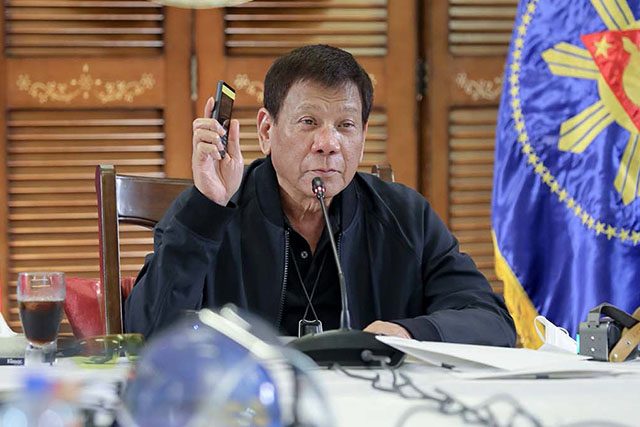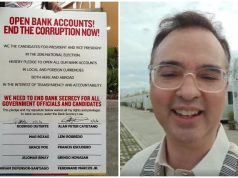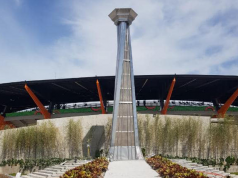
(Updated Oct. 26 at 6:10 p.m.) The high approval rating of President Rodrigo Duterte from a major poll drew questions on the survey process given the various issues surrounding his administration’s pandemic response.
In the latest national survey of Pulse Asia Research Inc., Duterte received the highest approval rating of 91% in both trust and performance ratings among the top national officials.
This is followed closely by his close allies Senate President Vicente Sotto III who enjoyed 84% for performance and 79% for trust, and Speaker Alan Peter Cayetano with 70% for performance and 67% for trust ratings.
Vice President Leni Robredo, who rolled out her office’s own assistance programs at the height of the coronavirus lockdowns, received 57% for performance and 50% for trust.
The lowest among the four was Supreme Court Justice Diosdado Peralta with a 44% performance and 39% trust approval ratings.
This nationwide survey called “Ulat ng Bayan” was conducted from September 14 to 20 through face-to-face interviews among 1,200 participants aged 18 years old and above.
- The pollster also cited several issues during the time of the survey. These include
- The massive corruption allegations against executives of the Philippine Health Insurance Corporation
- The public backlash against the artificial white sand beach along Manila Bay worth P349 million
- The preparations for the resumption of classes
- The absolute pardon Duterte granted to US Marine Joseph Scott Pemberton who killed Jennifer Laude in 2014
While these national concerns mostly drew heavy criticisms among Filipinos online, the results of this survey appeared to show that Filipinos were rather “appreciative” of the government’s efforts.
“Most Filipinos are appreciative of the work done by four of the country’s leading government officials; public assessment of these officials’ performance is essentially unchanged between December 2019 and September 2020,” Pulse Asia said.
During a virtual briefing in Boracay on October 5, presidential spokesperson Harry Roque welcomed and celebrated this development.
“Patunay lang itong performance level at trust level ni Presidente doon sa katotohanan na ayaw ng mga Pilipinong namumulitika sa panahon po ng aberya gaya ng pandemya. Tigil na po ang pulitika muna,” Roque said.
Questions raised
The phrase “Pulse Asia” and “Duterte” immediately trended on Twitter as critics and supporters of the administration expressed mixed reactions on the results.
Some Filipinos, however, focused more on Pulse Asia’s credibility in terms of its survey process and the timing.
Twitter user @JohnnyGabcakes pointed this out and also attached a screenshot of a calculation of Pulse Asia’s sample size.
“Don’t question the math, numbers don’t lie. Question the Pulse Asia’s survey process for its authenticity and reliability,” the user said.
Statistically speaking, a sample size of 1,200 is okay for a 16M population with 2.8 margin of error at 95% confidence level. Don't question the math, numbers don't lie. Question the Pulse Asia's survey process for its authenticity and reliability. pic.twitter.com/HPBF7TYgWv
— Johnny Cupcakes 🎂 (@JohnnyGabcakes) October 5, 2020
Political science scholar Cleve Arguelles, meanwhile, questioned why such a survey was even made in the first place.
“What we should be talking about is how & why public support & approval of Duterte survives even the mismanaged pandemic,” he said.
Not productive to dismiss the latest Pulse Asia (@pulse_ph) survey as false/manipulated. The technical details are publicly available. What we should be talking about is how & why public support & approval of Duterte survives even the mismanaged pandemic. https://t.co/X4bydYpHEY
— Cleve Arguelles (@CleveArguelles) October 5, 2020
Advocate Thysz Estrada likewise criticized the timing and motive for it.
What we should always interrogate whenever we are presented with survey data is 1.) Was it done in accordance to sound statistical methods/analysis? 2.) This costs money. Who commissioned it? 3.) Timing. Surveys sway public opinion. What opinion did the sponsor want to influence?
— Panlasang Pinay (@thysz) October 5, 2020
Another user noted that critics shouldn’t dismiss Pulse Asia surveys as they have historically indicated personalities and parties who were likely to prevail in forthcoming elections.
“Easy to say that Pulse Asia and SWS is manipulating data, but these are the same surveys that predicted both the 2016 and 2019 election results,” the user wrote.
Related polls
In the past months, the Duterte administration has touted positive survey results from other pollsters.
Last April, state-run Philippine News Agency reported that survey results from a polling organization called Gallup International Association or GIA showed that 80% of Filipinos believed that the government’s handling of the health crisis was done “well.”
This pollster, however, was different from the Gallup Inc. often used and cited by US-based magazines such as CNN and USA Today.
Last August, the Palace lauded the results from Publicus Asia Inc., a political management firm, where the administration received 75% approval ratings.
Political strategist Malou Tiquia, founder of Publicus Asia, wrote in an email to Interaksyon that Publicus has been involved in polling for private clients since 2007 and launched a public, non-commissioned survey called PAHAYAG as corporate social responsibility effort.
“At the height of the pandemic, it was only our NCR COVID-19 surveys that measured three times and gave community feedbacks to national and local governments on how the pandemic was being managed. Surely, she would have seen that via our website since we publish our methodology, results and are readily accessible to all,” Tiquia wrote in a response to an earlier version of this report.
—
Editor’s Note: The latest version of this article amends an observation previously reported that Publicus Asia Inc. is “not a known polling firm.”









